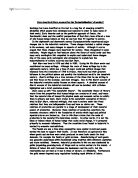Hegel’s views became the first part of his beliefs and he would later add French Radicalism, and the ideas of Adam Smith, Thomas Malthus and David Ricardo. These people explained how the movements of people and goods in this 19th century era were controlled by the invisible hand of the market (Collins and Makowski, 32-33).
While researching all of these philosophers, Marx met Fredrich Engels who would become Marx’s sidekick for the remainder of his life. Engels had just returned to France from England after publishing his very controversial work entitled: The Condition of the Working Class in England (1844). This piece of literature outlined everything that Engels felt was wrong with the working class in England. This was the first time someone had directly challenges the system in that country. Needless to say Engels and Marx were on the same page in their beliefs and the two were soon thrown out of France and then Belgium for their radical writings. They soon began attending underground meetings of labor unions, which were illegal. They called themselves the communist league. Here, a manifesto was written by Marx and his colleagues called the Communist Manifesto. This would cause a riot by Unemployed workers in Paris. He was soon banished from Prussia, and finally settled in London (Collins and Makowski, 33).
It was in London where Marx married his long time sweetheart, and started to write. Marx and his family were extremely poor. Many of his children died of malnutrition as his family lived in one of the poorest sections of London. The fact that Marx was poor in interesting because his beliefs often centered around the proletariat, or the working class poor people.
In 1867, Marx published Das Capital, a piece that some would argue helped bring down the world. In this book, Marx outlined his beliefs on how society should work. Marx envisioned a classless society in the place of capitalism. He believed property should be owned collectively and used for the benefit of all people. He separated society into two classes. The Bourgeoisie were the land and factory owners. These people controlled much of the wealth in Europe at the time. The proletariat,on the other hand were workers. These people worked for the benefit of the owners. He felt the Bourgeoisie were exploiting the proletariat for their benefit. Marx felt this was wrong.
The other problem with this society according to Marx and Engels was private property. They felt that men who owned property controlled their wives and children. This would eventually lead to controlling workers in a factory, they argued (Sernau, 18).
As mentioned earlier Marx was not fond of capitalism for various reasons including these:
Wealth Accumulation-According to Marx, the more money a society had, the worse it was. The only way wealth was good, was if society had enough to evenly distribute it to everyone. At this point, Marx argued, society was not ready for it.
Narrowing of the class structure- Marx acknowledged that society had more than the two classes outlined above, but he felt the forces of capitalism drove society back into these two classes. Smaller businesses would eventually be driven out by larger capitalist businesses.
Homogenization of labor- Under old systems, people had a trade and made things they were good at making, and made things they wanted to make. In other words, people had their own specialty. In the capitalist factory system, people were now replaceable making it easy for capitalists to control them.
Constant Crisis of profit- Capitalist owners are like they are today, interested in making a profit and cutting costs, even if it is at the expense of someone else. They pay workers enough for them to get by.
Alienation- Workers are generally not happy with what they do. This causes chaos and dissent in the work place, and makes people feel unworthy (Sernau, 18-19).
Marx was a conflict theorist who believed the workers should revolt against the ownership class. He was right in the fact that society was corrupt, and some people were making more than others, but that is society. Many conflict theorists believe Marx was right about class conflict, and conflict in general. He will be remembered as one of the first to debate the ethics of capitalism as well as the father of communism, although many believe Marx would not be happy with some of ways communism has been used in society, such as the absolute ruler, or dictator.
More than anyone else, Marx has inspired more revolutions and uprisings in our society. While some of his ideas and practices were correct, his views caused a lot of chaos in the world. He inspired such rulers as Stalin, and Mussolini. While his views and theories could have worked in theory, they were abused by dictators, and thus a black cloud has hung over Marx and his movement.







